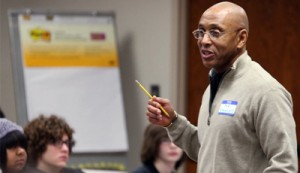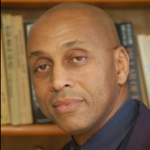Dr. Martin Luther King, Jr. (January 15, 1929-April 4, 1968) was a multi-faceted, multi-dimensional and multi-talented man. Yet, many often find themselves victims of 30-second sound bites on the 6 o’clock news where excerpts of his omnipresent “I Have a Dream” speech are played over and over ad infinitum; resulting in many failing to realize that there are at least two periods to Dr. King’s life. The second period was in sharp contrast to the Martin Luther King many in America are familiar with and celebrate with a national holiday the third Monday in January.
Period One began with the Montgomery Bus Boycott of December 1955, and culminates with the enactment of the Voting Rights Act of 1965. When, it could be reasonably argued, the Civil Rights movement began its decline. This period is replete with marches such as the Selma-to-Montgomery, Alabama trek and writings like King’s “Letter from a Birmingham Jail” penned while King was incarcerated in Birmingham and in response to white clergy who criticized him for being a trouble maker. It is a period with which many are familiar, unlike the next.
Period Two is more obscure and seldom discussed, perhaps as a result of its sheer poignancy. This period began in the fall of 1965, and continued to King’s brutal assassination on April 4, 1968. Ironically, it was a speech that King made exactly one year earlier (April 4, 1967) that would irrevocably change his life and, many believe, hasten his death. That audacious and uncompromising stand was his decision to deliver a speech entitled “Beyond Vietnam” — a speech said to have been heard around the world.

King said, “I agree with Dante—that the hottest places in hell are reserved for those who, during a period of moral crisis, maintain their neutrality.” Followers of King and members of the Southern Christian Leadership Conference (S.C.L.C.) and the National Association for the Advancement of Colored People (N.A.A.C.P.) importuned him to keep silent about the war because he risked alienating President Lyndon Johnson and the financial supporters of the S.C.L.C. King’s response to those who asked him to be quiet was, “I’m sorry, you don’t know me. I’m not a consensus leader. I don’t determine what is right and wrong by looking at the budget of the Southern Christian Leadership Conference or by taking a Gallup Poll of the Majority opinion. Ultimately a genuine leader is not a searcher of consensus but a molder of consensus.”
Dr. Martin Luther King, having decided to do what was morally correct, if not politically correct, began to unleash a barrage of vituperations at his white allies in government and the media. Many who had long supported his stand on nonviolence during sit-ins, freedom rides, and had also embraced his civil-disobedience in cities like Birmingham and Selma, voiced opposition to his stand on Vietnam. King was adamant:
[gdlr_stunning_text background_color=”#f3f3f3″]
“They applauded us in the sit-in movement when we non-violently decided to sit
in at lunch counters. They applauded us on the freedom rides when we accepted
blows without retaliation; They praised us in Birmingham and Selma, Alabama.
Oh, the press was so noble in its applause and praise when I would say, ‘Be
nonviolent toward Bull Connor,’ ‘Be nonviolent toward Jim Clark.’ There is
something strangely inconsistent about a nation and a press that would praise you
you when you say, ‘Be nonviolent toward Jim Clark,’ but will curse and damn you
when you say, ‘Be nonviolent toward little brown Vietnamese children!’”
[/gdlr_stunning_text]
It is clear that Dr. Martin Luther King, Jr. did more than just sing songs of passivity. During the last three years of his life he began to provide a very analytical perspective on the evils of militarism, racism and economic exploitation; a tune that was and still is dismissed as so much harmonic dissonance.
To Your Journey!
Ahmad Daniels, M.Ed., Transformation Facilitator and Life Coach
 Ahmad Daniels holds a Master of Education from the University of North Carolina in Charlotte and for decades has facilitated workshops both within and outside of the U.S. that serve to broaden people’s understanding of the African American experience. He played an active role in the 2001 United Nations World Conference on Racism, Racial Discrimination, Xenophobia and Related Intolerance, the location in which it was held, Durban, South Africa. He has chaired meetings of the Global Afrikan Congress in Amsterdam, London, Berlin, Paris, and Accra. To keep his mind and body sharp, he is an active athlete, having completed over a dozen marathons.
Ahmad Daniels holds a Master of Education from the University of North Carolina in Charlotte and for decades has facilitated workshops both within and outside of the U.S. that serve to broaden people’s understanding of the African American experience. He played an active role in the 2001 United Nations World Conference on Racism, Racial Discrimination, Xenophobia and Related Intolerance, the location in which it was held, Durban, South Africa. He has chaired meetings of the Global Afrikan Congress in Amsterdam, London, Berlin, Paris, and Accra. To keep his mind and body sharp, he is an active athlete, having completed over a dozen marathons.

